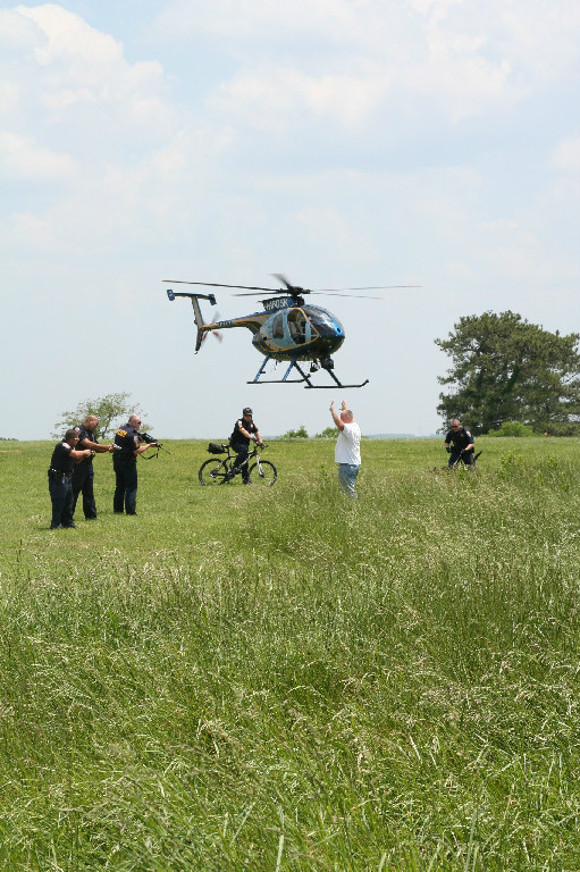*This photo is from a training exercise that I was a part of, probably around 2006 or so. I’m the one holding the rifle
As a retired police officer, I get this question a lot: “Why are there so many different kinds of police departments and agencies?” Here is an attempt to answer that question.
In the United States, there are a variety of different types of Law Enforcement agencies. First of all, there are municipal or city police departments. These can range in size from two or three officers in a small, rural town to close to thirty-five thousand officers in the New York City Police Department. City police departments are responsible for law enforcement activities within the city limits.
Moving out of the city into the unincorporated areas, the responsibility shifts to county police or sheriff’s departments. County police departments do not exist in every region or area. They tend to be more prevalent in larger, metropolitan areas. County police departments handle police services in the unincorporated areas and in cities that do not have their own police department.
In those counties that have a county police department, the sheriff’s department is usually limited in it’s scope of responsibility. In these areas the sheriff’s office tends to focus on serving civil papers and arrest warrants, court security, and prisoner transport. They are usually also responsible for running the local jail. The sheriff is normally the highest ranking elected law enforcement official in their particular jurisdiction. Police chiefs, on the other hand, are appointed by city councils or county commissions.
In counties, especially rural counties that do not have a county police department, the sheriff’s office is the primary law enforcement agency for that area. They will handle all of the above mentioned responsibilities, as well as answering citizen requests for police services including 911 calls.
Every state in America also has some type of state law enforcement agency. In some states these are true state police organizations. These agencies handle large cases that might require investigation throughout the entire state. State police departments also could be called in to investigate local police agencies for corruption or use of force complaints. In many jurisdictions, if available, a state agency will investigate officer involved shootings involving county or city police officers. State police departments are also responsible for traffic enforcement on interstates and state highways.
Other states, such as Georgia, for example, have a different system. Georgia has two state agencies with differing areas of responsibility. The Georgia State Patrol provides traffic enforcement throughout the state. They conduct speed enforcement, DUI enforcement, and investigate motor vehicle accidents. The State Patrol also backs up local officers in rural areas where manpower is limited.
The Georgia Bureau of Investigation is the agency that conducts large criminal investigations that might involve multiple cities or counties. The GBI also assists small agencies in investigating serious crimes such as rapes, murders, and large drug investigations. Many of Georgia’s small police departments allow the GBI to handle all the criminal investigations within their jurisdiction.
Federal Agencies are the next major type of law enforcement organization. The Federal Bureau of Investigation, the Drug Enforcement Administration, and the Department of Alcohol, Tobacco, Firearms and Explosives are the three that most people are familiar with. These agencies and others are under the control and oversight of the Department of Justice.
The United States Marshals Service, the United States Customs and Border Protection, and the United States Secret Service are other agencies that are also part of the federal law enforcement system. These agencies and others are under the control and oversight of the Department of Homeland Security.
Each federal police department has a specific mission. Federal agencies are prohibited from exercising general police powers. They do enforce federal laws and work closely with local agencies on large, long-term cases. Federal law enforcement agencies are able to bring in resources that city and county agencies might not have. These multi-jurisdiction cases often bring federal, state, and local police departments together to conduct investigations that a single police agency would have difficulty handling.
In theory, every law enforcement agency should be focused on serving the citizens of their respective jurisdictions. And in the vast majority of cases, this is exactly what they do. A simple perusal of current news headlines, however, also shows that police agencies can be used for political ends. Their powers can be restricted or they can be used as a weapon to go after one’s political foes.
In the vast majority of police departments, however, there are men and women committed to protecting and serving. Day in and day out, police officers do more good and have more of a positive impact than will ever be realized. The men and women in blue are our first line of defense and deserve our respect and support.
My wife, Annie, and I are serving the Lord in the United States, Africa, India, and in South America. We are helping develop leaders, plant churches, and expand God’s Kingdom. Would you consider joining our support team? Just click here to get involved. Thanks so much!

